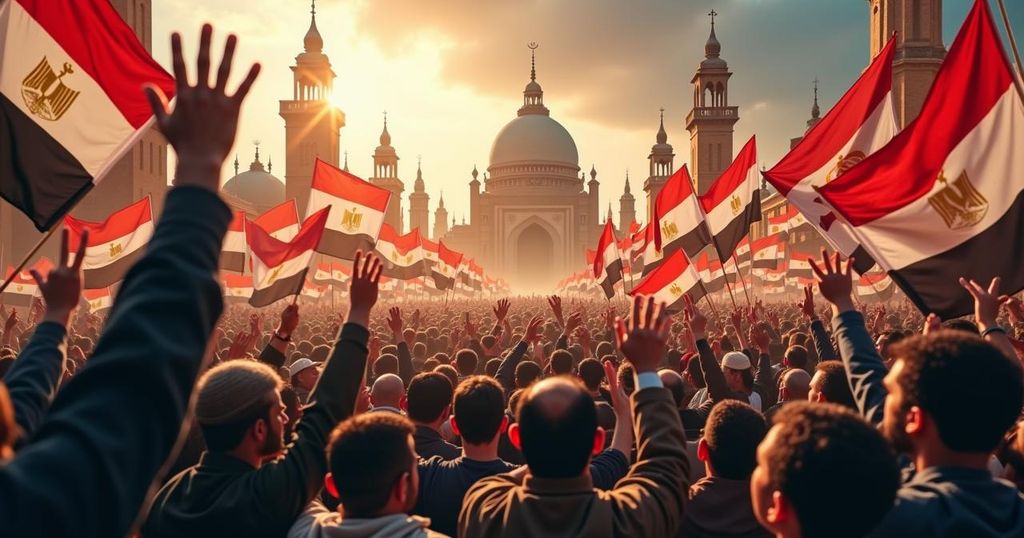The Rise and Fall of the Muslim Brotherhood in Egypt

The Muslim Brotherhood participated in the 2011 Egyptian protests that led to President Mubarak’s downfall. They founded the Freedom and Justice Party, achieving significant electoral success and electing Mohammed Morsi as President in 2012. However, dissatisfaction with Morsi’s governance led to his removal by the military in 2013, inciting a severe crackdown on the Brotherhood, which was subsequently designated as a terrorist organization, leading to widespread arrests and trials.
In January 2011, a secular youth-led protest movement arose in Egypt, challenging the regime of President Hosni Mubarak. The Muslim Brotherhood, after an initial period of hesitation, endorsed this movement and encouraged its members to participate in the demonstrations. This activism led to Mubarak’s resignation in February, allowing the Muslim Brotherhood to engage openly in the nation’s political landscape. Despite initially promising not to pursue the presidency, internal discord prompted a senior member, Abdel-Moneim Abul-Fotouh, to declare his candidacy, resulting in his expulsion from the group. Following the uprising, the Brotherhood established the Freedom and Justice Party in April 2011, seeking official recognition from the interim government. The party aimed to adhere to Islamic principles while remaining inclusive, and it was officially recognized by June. The Freedom and Justice Party subsequently achieved significant success in the parliamentary elections between November 2011 and January 2012, obtaining approximately 47 percent of the seats in the People’s Assembly, a crucial legislative body. This strong showing enabled them to influence the formation of a 100-member Constituent Assembly charged with drafting a new constitution. In March 2012, the Muslim Brotherhood commenced discussions about fielding a presidential candidate. Ultimately, they nominated Khairat al-Shater, though he was disqualified due to prior criminal convictions. Mohammed Morsi replaced him as the Party’s candidate and won the presidency in a runoff election held in June 2012. However, his administration faced substantial opposition regarding perceived failures in economic management and public safety, culminating in widespread protests by June 2013, which coincided with the one-year anniversary of his inauguration. Following escalating tensions and a military ultimatum, Morsi was removed from power on July 3, 2013, leading to a significant clampdown on the Muslim Brotherhood. Security forces violently suppressed pro-Morsi demonstrations, resulting in numerous fatalities. The Egyptian government undertook comprehensive measures against the Brotherhood, including mass arrests and designating the organization as a terrorist group in late 2013. This declaration followed a wave of violence that authorities attributed to the Brotherhood, despite their denial of involvement. Following Morsi’s ouster, adversities continued with mass trials and harsh sentences meted out to Brotherhood members, further entrenching a cycle of political instability and repression in Egypt.
The Muslim Brotherhood, founded in Egypt in 1928, is an influential Islamist organization that gained prominence in Egyptian politics, particularly following the Arab Spring. The group initially adopted a social and political reformist approach, focusing on education and social welfare. However, the 2011 protests that led to the resignation of Hosni Mubarak marked a turning point, unlocking their potential to influence national governance. Though they initially pledged to adopt a cautionary approach concerning political power, the Brotherhood ultimately fielded candidates in subsequent elections, reflecting an adaptation to the changing political climate of Egypt. The period of Morsi’s presidency was characterized by significant challenges and opposition, culminating in a military coup that consequently relegated the Brotherhood to a status of suppression and criminalization, drastically altering the political landscape of Egypt.
The events surrounding the Muslim Brotherhood from the uprising of 2011 to the military coup in 2013 illustrate the complexities of political engagement in post-revolutionary Egypt. Initially gaining substantial influence through democratic means, the Brotherhood faced severe backlash that led to their dramatic suppression following President Morsi’s ousting. The government’s labeling of the Brotherhood as a terrorist organization marked a significant regression in the political freedoms envisioned post-Mubarak. The harsh crackdown on Brotherhood members and supporters underscores the ongoing tensions that continue to challenge Egypt’s political stability and governance.
Original Source: www.britannica.com






